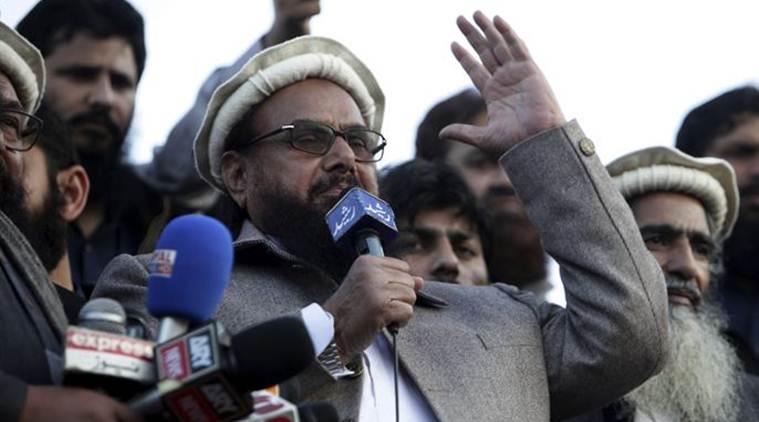 Hafiz Saeed, chief of the Jamaat-ud Dawa (JuD) — a front for the Lashkar-e-taiba — has been convicted in two cases. (File Photo)
Hafiz Saeed, chief of the Jamaat-ud Dawa (JuD) — a front for the Lashkar-e-taiba — has been convicted in two cases. (File Photo)
On February 12, Hafiz Saeed, chief of the Jamaat-ud Dawa (JuD) — a front for the Lashkar-e-Taiba — was convicted in two cases and sentenced to five-and-a-half years imprisonment in each. One charge related to membership of a proscribed organisation and the other to fundraising and money laundering for terrorism. The cases had been filed against Saeed, a globally designated terrorist with a $10 million bounty on his head under Pakistan’s Anti-Terrorism Act, 1997.
Behind the timing of the filing of the cases and Saeed’s arrest in July 2019 were related to two events. The first was Prime Minister Imran Khan’s visit to the US in July where he was to meet President Donald Trump. The second was pressure from the Paris-based international terror-financing watchdog, the Financial Action Task Force (FATF). Prior to the February 2018 meeting of the FATF, Pakistan promulgated an ordinance that provided for proscribing individuals and entities listed by the UN Security Council. The JuD was thus proscribed. However, the move did not cut much ice and the FATF put Pakistan on its grey list in June 2018. It was given 15 months to implement a 27-point action plan to address the deficiencies in its money laundering and terror-financing regimes. Subsequently, the ordinance was allowed to lapse and the JuD came off the list of banned organisations.
In February 2019, the FATF decided to continue the grey listing of Pakistan for its non-compliance of international standards. This galvanised Pakistan into proscribing the JuD in March 2019, along with its affiliated groups. The government also announced taking over the assets of these groups and freezing their bank accounts.
Prior to his July 2019 arrest, Saeed had been arrested and released eight times since 2001. His last arrest was on January 30, 2017 and he was released on November 22, 2017, due to “insufficient evidence to justify [his] continued detention”. Pakistan expected Saeed’s conviction to strengthen its case for being removed from the grey list because this was the first time that he had actually been convicted.
While there was little chance of Pakistan being blacklisted given that allies like China, Malaysia and Turkey would have vetoed such attempts, the plenary session of the FATF that was held from February 16-21 in Paris decided to retain Pakistan on the grey list. In fact, what is notable is that even China and Saudi Arabia joined the majority to warn Pakistan to take steps required on 13 points out of the 27-point action plan of the FATF. If Pakistan does not do so, it could face blacklisting.
Saeed’s conviction is likely to be struck down on appeal on the ground that in 2009, a full bench of the Lahore High Court had declared that he was not a member of the banned LeT. According to Saeed’s lawyer, he had left the LeT on December 24, 2001, while the organisation was banned on January 14, 2002. The moot point, however, is whether the action against Saeed is indicative of a new direction in Pakistan’s counter-terrorism policy, or merely a tactical ploy, as before, to escape economic sanctions.
Apart from India, scepticism is equally rife in Pakistan. Dawn put it well in its editorial: “As has been witnessed for nearly two decades now, the state moves to ban militant outfits, but, in very little time they are back, up and running, with new names and the entire structure of violence intact.”
For India, what is important is that Saeed has been convicted for links with terrorist groups and raising funds for terrorism and not for his role in Mumbai 26/11. If, however, the conviction holds, and this is a big if, it would be an acknowledgment that Saeed was and is the LeT chief. This would give a boost to New Delhi’s assertions. It is precisely for this reason the conviction is likely to be overturned.
The bottom line is that action against organisations like the JuD and terrorists like Saeed are tactical. The world has seen them for what they really are — motivated solely to insulate Pakistan. The world must watch the next steps on Hafiz Saeed to judge whether Pakistan has the resolve to make and sustain decisions to rid itself and its neighbours of the menace of terrorism.
This article first appeared in the print edition on February 25, 2020 under the title ‘Without conviction’. Devasher is member, National Security Advisory Board.